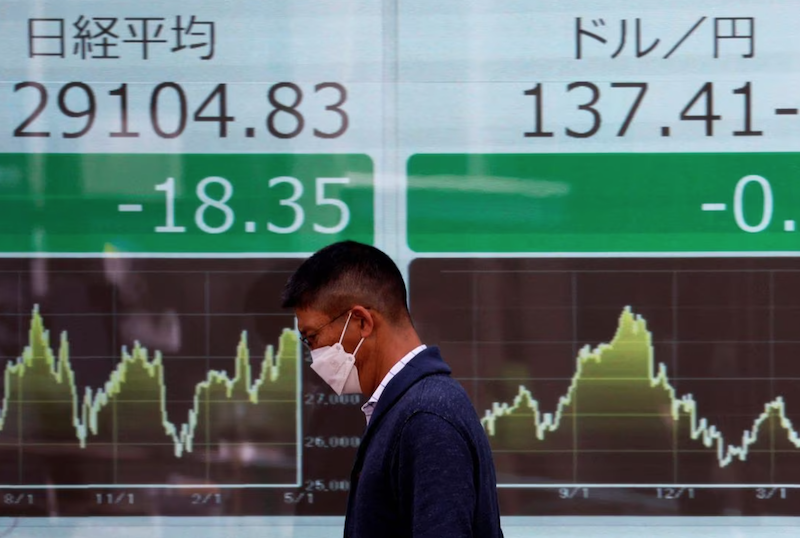Asian investors began the week in a positive mood, buoyed by a raft of stimulus promises by Beijing to lift its stumbling economy and by bargain-buying opportunities after last week’s index slides.
Beijing announced on Sunday it would halve the stamp duty on stock trades in the latest attempt to boost the struggling market and moved to support its ailing housing sector. China’s securities regulator also approved the launch of 37 retail funds.
However, the mood was still cautious ahead of readings on US jobs and inflation that could decide whether interest rates have to rise again.
Also on AF: ‘Nearly 2 Million Extra Deaths’ After China Ended Covid Curbs
China stocks rose after the announcement of those stimulus measures but the market had erased most of its strong opening gains amid broader concerns about a stuttering economy.
Shares rose in most sectors, with securities brokers climbing about 3%, after jumping 10% at open.
The Hang Seng Index gained 0.97%, or 174.36 points, to 18,130.74.
The Shanghai Composite Index rose 1.13%, or 34.56 points, to 3,098.64, while the Shenzhen Composite Index on China’s second exchange edged up 0.95%, or 17.83 points, to 1,900.50.
Real estate developers also advanced 4% amid the latest measures to aid the sluggish property markets, including relaxing residential housing loan rules and supporting affordable housing.
The package of measures come after China’s stock benchmark dropped to nine-month lows earlier this month, erasing all gains made following the reopening from Covid curbs, as the economic recovery rapidly lost steam.
Despite the latest action to boost confidence, foreign investors offloaded a net 8 billion yuan ($1.10 billion) of Chinese stocks via the Stock Connect on Monday, having been net sellers in 14 out of 15 previous sessions.
China’s Seafood Ban Hits Japan Stocks
Japan’s Nikkei share average posted its sharpest daily gains in two months as investors bought back stocks after losses at the end of last week, but tourism-related shares fell amid worries about the impact of a ban on the country’s seafood by China.
China announced the move after Japan released treated radioactive water from a wrecked nuclear power plant into the Pacific Ocean.
“China’s ban [on Japanese seafood imports] could become a big drag on Japanese stocks, depending on how big the issue could become,” Masuzawa said.
The Nikkei jumped 1.73% to close at 32,169.99 in its biggest daily rise since June 28. The broader Topix climbed 1.47% to 2,299.81.
Elsewhere across the region, in earlier trade, Sydney, Singapore, Seoul, Taipei, Mumbai, Bangkok, Jakarta and Wellington all enjoyed strong starts to the week.
MSCI’s broadest index of Asia-Pacific shares outside Japan climbed 1.0%, having eked out minor gains last week to break a three-week losing streak.
The improvement in risk sentiment saw Eurostoxx 50 futures add 0.7%, while FTSE futures were closed for a holiday. S&P 500 futures and Nasdaq futures both edged up 0.1%, extending last week’s modest rise.
The market did manage to weather a slightly hawkish outlook from Federal Reserve chair Jerome Powell, who reiterated they might have to raise rates again but promised to move “carefully”.
Much will depend on the flow of US data which had been running hot until a batch of manufacturing surveys last week pointed to a slowdown both at home and abroad.
Investors Wait on Key ISM Survey
That raised the stakes for this week’s ISM survey on manufacturing, along with reports on payrolls, core inflation and consumer spending.
Figures on EU inflation this week may also be instrumental in whether the European Central Bank decides to hike next month.
The odd man out was Bank of Japan Governor Kazuo Ueda who on Friday reiterated the need for policy to stay super loose.
That divergence kept the yen under pressure and early on Monday the dollar was firm at 146.40, within a whisker of Friday’s near 10-month top of 146.64.
Yields on US two-year notes were up at 5.104% after touching their highest since early July on Friday. High yields and a strong dollar have been a headwind for gold which was idling at $1,915 an ounce.
Oil prices drew some support from a sharp rise in US diesel prices, though concerns about Chinese demand remains a drag. Brent edged up 1 cent to $84.49 a barrel, while US crude rose 6 cents to $79.89 per barrel.
Key figures
Tokyo – Nikkei 225 > UP 1.73% at 32,169.99 (close)
Hong Kong – Hang Seng Index > UP 0.97% at 18,130.74 (close)
Shanghai – Composite > UP 1.13% at 3,098.64 (close)
London – FTSE 100 > UP 0.07% at 7,338.58 (Friday close)
New York – Dow > UP 0.73% at 34,346.90 (Friday close)
- Reuters with additional editing by Sean O’Meara
Read more:
China Slashes Stamp Duty on Stock Trades
China Slowdown Dragging Down Company Stocks, Currencies
China Evergrande Sinks 80% as Trading Resumes After 17 Months
























